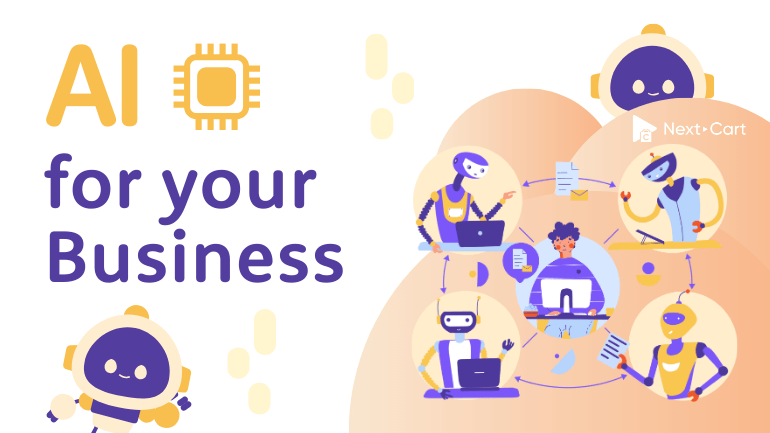
In the rapidly evolving world of e-commerce, staying ahead of the competition requires not just innovation but also the integration of cutting-edge technology. Artificial Intelligence (AI) has become a cornerstone of modern online businesses, offering unprecedented opportunities to enhance customer experiences, streamline operations, and drive revenue growth. In this blog, we’ll explore how AI is transforming e-commerce and provide actionable strategies for optimizing your online business.
AI-Driven Personalization
Customer Segmentation
Understanding your customers is key to delivering personalized experiences. AI algorithms analyze customer behavior, purchase history, and browsing patterns to create highly accurate customer segments. This allows businesses to tailor marketing efforts, offers, and communications to each segment, increasing engagement and conversion rates.
Product Recommendations
One of the most visible applications of AI in e-commerce is product recommendation engines. By analyzing data from previous purchases, browsing history, and even social media interactions, AI can suggest products that are most likely to appeal to individual customers. This not only enhances the shopping experience but also boosts average order value and customer loyalty.
Dynamic Pricing
AI-powered dynamic pricing adjusts product prices in real-time based on factors such as demand, competitor pricing, and customer behavior. This strategy ensures that prices are always optimized to maximize sales and profit margins while remaining competitive in the market.
AI-Powered Chatbots and Customer Service
24/7 Support
Customer expectations are higher than ever, and AI-powered chatbots provide a solution by offering round-the-clock support. These chatbots can handle a wide range of inquiries, from simple FAQs to complex order issues, freeing up human agents to focus on more strategic tasks.
Enhanced Customer Interaction
Modern AI chatbots are increasingly capable of understanding context and providing more personalized responses. By leveraging natural language processing (NLP), these bots can engage in meaningful conversations with customers, enhancing satisfaction and driving repeat business.
Automated Issue Resolution
AI can streamline the resolution of common customer issues, such as order tracking or returns, by automating the process. This not only speeds up response times but also reduces the workload on customer service teams, leading to a more efficient and cost-effective operation.
AI in Inventory and Supply Chain Management
Demand Forecasting
AI excels at predicting future trends by analyzing historical data and market conditions. In e-commerce, this capability is crucial for demand forecasting, helping businesses maintain optimal inventory levels. Accurate forecasts reduce the risk of overstocking or stockouts, ensuring that products are available when customers want them.
Automated Inventory Management
By integrating AI with inventory management systems, businesses can automate the tracking and replenishment of stock. AI can monitor inventory in real-time, automatically placing orders with suppliers when stock levels fall below a certain threshold. This reduces manual intervention and minimizes the risk of human error.
Optimized Logistics
Logistics is a complex aspect of e-commerce, and AI can help optimize everything from warehouse operations to last-mile delivery. AI algorithms can determine the most efficient routes for deliveries, select the best shipping partners, and even predict potential delays, ensuring that products reach customers on time.
AI for Enhanced Security
Fraud Detection
E-commerce businesses are prime targets for fraud, and AI offers robust tools for detecting and preventing fraudulent activities. By analyzing transaction data and identifying patterns that indicate fraud, AI can flag suspicious transactions in real-time, protecting both the business and its customers.
Secure Payment Processing
AI enhances payment security by monitoring and analyzing transaction behaviors. This can help detect unusual patterns or anomalies, allowing businesses to intervene before fraudulent transactions are completed. AI-driven payment gateways also offer an additional layer of security, ensuring that customer data is kept safe.
Data Protection and Privacy
With stringent data protection regulations in place, e-commerce businesses must ensure that customer data is handled securely. AI helps in automating compliance with these regulations, such as GDPR, by managing data access, ensuring encryption, and monitoring for potential breaches.
AI in Marketing and Advertising
Targeted Advertising
AI transforms digital advertising by enabling highly targeted campaigns. By analyzing user data, AI can segment audiences and deliver personalized ads that resonate with specific groups. This increases the effectiveness of advertising efforts, leading to higher click-through rates and better ROI.
Content Creation
AI is increasingly being used to automate content creation, from product descriptions to marketing emails. AI tools can generate relevant and engaging content based on predefined criteria, ensuring consistency in messaging while reducing the time and resources required for content production.
SEO and Analytics
Search engine optimization (SEO) is critical for driving organic traffic, and AI can enhance SEO strategies by analyzing user behavior, search trends, and competitors. AI-powered tools can recommend keyword optimizations, monitor ranking fluctuations, and provide actionable insights to improve a site’s visibility.
Conclusion: The Future of AI in E-commerce
AI is not just a trend but a fundamental shift in how e-commerce operates. As AI continues to evolve, businesses that embrace these technologies will be better positioned to meet customer demands, improve operational efficiency, and achieve long-term growth. The key is to stay informed about emerging AI trends and be willing to adapt and integrate these innovations into your e-commerce strategy.